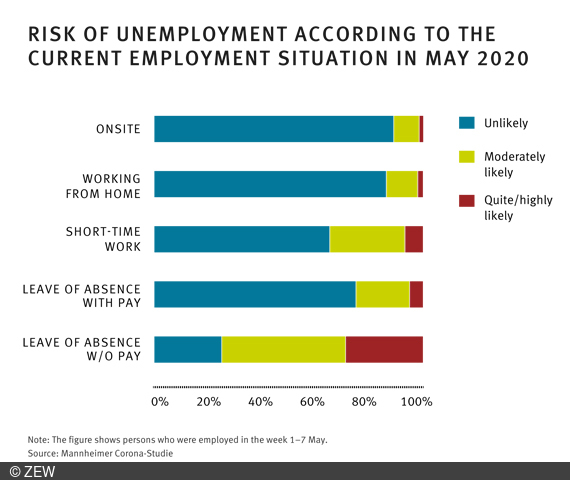A Third of Short-Time Workers in Germany Fear for Their Jobs
ResearchDespite the massive drop in production on account of the coronavirus pandemic in March/April 2020, the vast majority of German workers still view their own jobs as relatively secure. This sense of security, however, does not apply to employees in short-time work schemes, people on leave of absence without continued pay, and industries particularly affected by the lockdown. These are the central findings of the latest report from the “Mannheimer Corona-Studie” (“Mannheim Coronavirus Survey”) by the University of Mannheim and ZEW Mannheim, which focuses on a subjectively assessed risk of unemployment.
Despite the severe economic slump in March and April, the proportion of respondents who see little or no risk of losing their jobs for the year fell from 92.5 to 85.1 per cent between January and May.
However, the effect is much more pronounced for certain subgroups. About one third of short-time workers consider their own jobs to be very much at risk. Professor Friedrich Heinemann, co-author of the study and research department head at ZEW Mannheim, notes that “short-time work is no longer regarded by those affected as a reliable protection against unemployment.”
People who have been let go without pay are even more pessimistic, with only 26.9 per cent of them believing that they will keep their jobs until after the crisis. “It’s especially those employees who were already in precarious job situations before the coronavirus outbreak that are feeling the negative consequences right now. In the first weeks of the lockdown, they had a much higher risk of unemployment, and now they estimate their future unemployment risk to be still higher compared to others,” says Katja Möhring, co-project manager and professor of sociology at the University of Mannheim.
Affected sectors doubt the effectiveness of crisis packages
Growing concerns about job losses are widespread in sectors that were particularly affected by the acute crisis phase in spring. This is especially true for the gastronomic, arts and entertainment, and retail sectors. In arts and entertainment, over a third of those surveyed view the loss of their own job as realistic.
“There’s confidence in the government’s anti-crisis measures. Many people in the particularly affected sectors, however, doubt that the extensive crisis packages will actually be able to prevent serious job losses,” says Professor Heinemann.
The Mannheim Coronavirus Survey builds on the methodology and infrastructure of the German Internet Panel (GIP). The GIP is based on a random sample of the general population in Germany and has been regularly carried out by the Collaborative Research Centre 884 “Political Economy of Reforms” since 2012. The Mannheim Coronavirus Survey provides daily results on social and economic aspects, moods, social behaviours, and acceptance of political measures during the coronavirus crisis, besides in-depth analyses of selected topics. The survey data the current analysis is based on was collected at the beginning of May. Due to the panel structure of the survey, the assessments for May can be compared with the assessments of the same individuals for January, i.e. before the virus outbreak in Germany.
